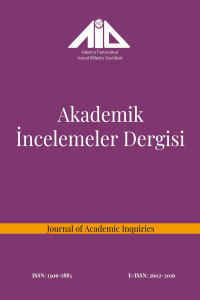Abstract
Since the beginning of history, the relationship between man and the space he has lived in and the
break from this socially constructed space is a remarkable issue. This relationship does not only
occur with a break from the social space that is built, but also the social construction in the place
where the spatial change comes from, opens the door to a new relationship and social change. In this
context, the effort to create a safe environment, which has been a basic need since the existence of
humanity, affects social change and the phenomenon of migration. Today, besides the classical
security understanding, other security elements have been added, especially in European states. The
political, economic, environmental and social security elements that the Copenhagen School deals
with in the "securitization" approach, which is put forward with a social constructivist
understanding, are the other parameters added to the classical approach. In recent years,
policymakers, non-state actors and the masses, who are disturbed by the presence of immigrants in
European countries, see immigration as a threat to their cultural security, which is a sub-element of
social security. They have taken this fact into account in their current policies and future strategies.
The main purpose of this study, which analyzes policymakers’ approaches to cultural security
through both literature review and anti-immigration discourses, is to reveal the relationship
between cultural security in social security and migration. The argument of the study clarifies why
and how the issue of culture is handled in the process of making immigration a security element.
Immigrants are often discursively presented as a threat to the social cohesion, cultural fabric and
identity of the target country, and then considered as a social actor that creates distrust as a "foreign
invasion"; It corresponds to the micro dimension of critical discourse analysis, which is the method
of the study, and the tool to create inferences.
References
- Akhtar, Salman. Göç ve Kültür: Kargaşa, Sağaltım ve Dönüşüm, çev. Sedef Ayhan. İstanbul: Sfenks Kitap, 2018.
- Buzan, Barry vd. Security: A New Framework For Analysis. ABD: Lynne Rienner Publisher, 1998.
Abstract
Tarihin başlangıcından itibaren insan ile yaşamış olduğu mekân arasındaki ilişki ve sosyal olarak inşa
ettiği bu mekândan kopuş dikkat çekici bir meseledir. Bu ilişki sadece inşa edilen sosyal mekândan
kopuş ile cereyan etmemekte, mekânsal değişikliğin ardından gelinen yerdeki sosyal inşa da yeni bir
ilişkinin ve sosyal değişimin kapısını aralamaktadır. Bu bağlamda, insanlığın varoluşundan itibaren
temel ihtiyacı olan güvenli çevre oluşturma gayretinin toplumsal değişime ve göç olgusuna olan
etkisi, günümüzde özellikle Avrupa devletlerinde klasik güvenlik anlayışının dışında Kopenhag
Okulu’nun sosyal inşacı bir anlayış ile ortaya koyduğu “güvenlikleştirme” yaklaşımının ana unsurları
olan siyasal, ekonomik, çevresel ve toplumsal anlamda bir güvenlik tehdidi olarak ele alınmaktadır.
Avrupa ülkelerinde son yıllarda politika yapıcılar, devlet dışı aktörler ve göçmenlerin varlığından
rahatsız olan kitleler göçü toplumsal güvenliğin alt unsuru olan kültürel güvenliklerine bir tehdit
olarak görmektedir. Güncel politikalarında ve gelecek stratejilerinde bu olguyu dikkate almışlardır.
Politika yapıcıların kültürel güvenliğe ilişkin yaklaşımlarını hem literatür derlemesi hem de göç
karşıtı söylemler üzerinden analiz eden bu çalışmanın temel amacı, toplumsal güvenlik içerisinde yer
alan kültürel güvenlik ile göç arasındaki ilişkiyi ortaya koymaktır. Çalışmanın argümanı göçün
güvenlik unsuru haline getirilmesi sürecinde kültür konusunun niçin ve nasıl ele alındığına açıklık
getirmektedir. Göçmenlerin genellikle söylemsel olarak hedef ülkenin sosyal uyum, kültürel doku ve
kimliğine bir tehdit olarak sunulması, devamında “yabancı istilası” olarak güvensizlik yaratan bir
sosyal aktör gibi düşünülmesi; çalışmanın yöntemi olan eleştirel söylem analizinin mikro boyutu ile
çıkarım yaratma aracına karşılık gelmektedir.
References
- Akhtar, Salman. Göç ve Kültür: Kargaşa, Sağaltım ve Dönüşüm, çev. Sedef Ayhan. İstanbul: Sfenks Kitap, 2018.
- Buzan, Barry vd. Security: A New Framework For Analysis. ABD: Lynne Rienner Publisher, 1998.
Details
| Primary Language | Turkish |
|---|---|
| Journal Section | Reserch Articles |
| Authors | |
| Publication Date | April 15, 2023 |
| Submission Date | June 26, 2022 |
| Published in Issue | Year 2023 Volume: 18 Issue: 1 |
Cite
Cited By
SURİYELİLERE YÖNELİK TEHDİT ALGISININ YABANCI DÜŞMANLIĞINA (ZENOFOBİ) ETKİSİ
Fırat Üniversitesi Sosyal Bilimler Dergisi
https://doi.org/10.18069/firatsbed.1339518
FOLKLOR VE KÜLTÜREL GÜVENLİK (I)
Motif Akademi Halk Bilimi Dergisi
https://doi.org/10.12981/mahder.1551159
This work is licensed under a Creative Commons Attribution-NonCommercial 4.0 International Licence.
Journal of Academic Inquiries accepts the Open Access Journal Policy for sharing knowledge.

